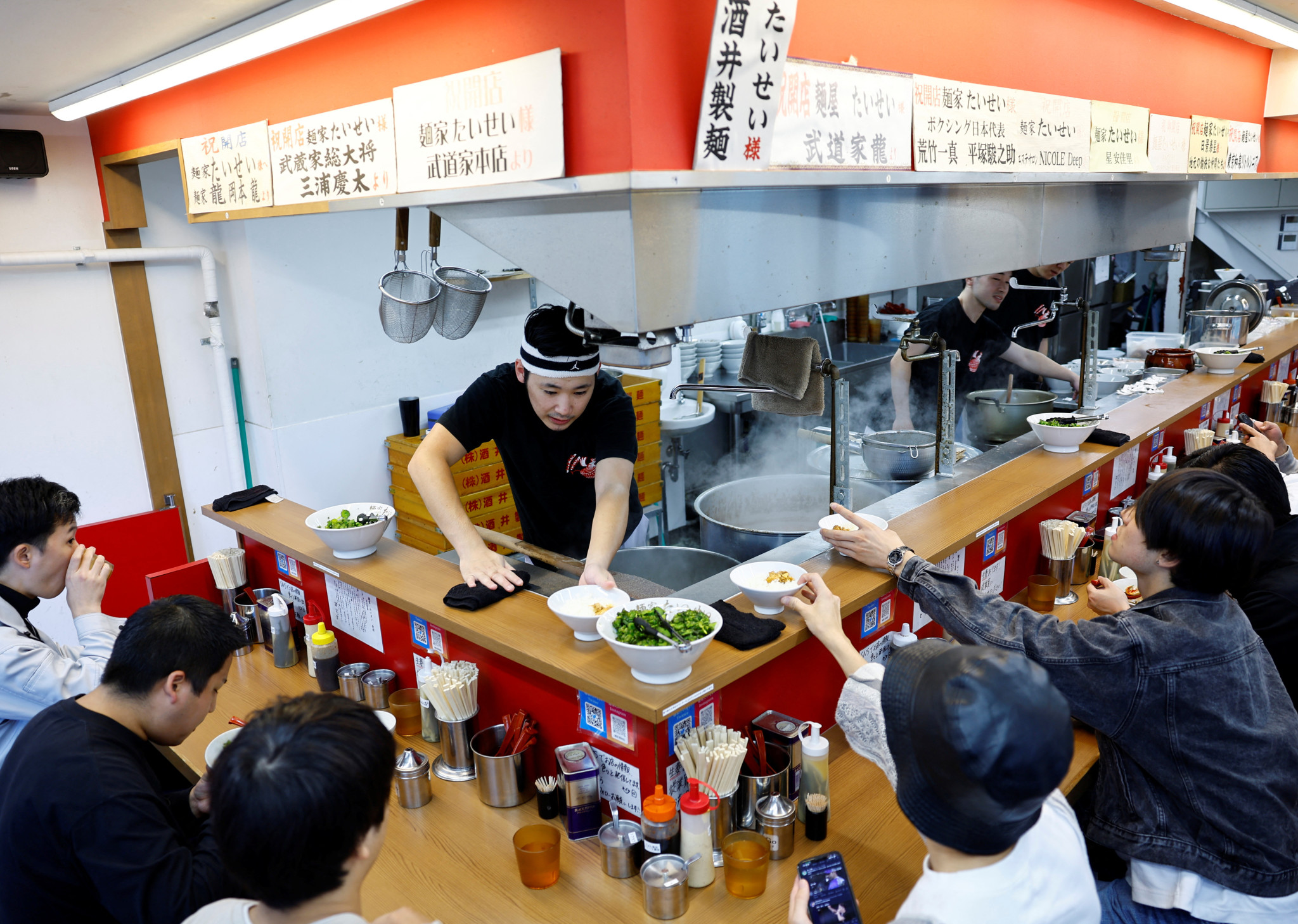Taisei Hikage is preventing a dropping battle at his Tokyo ramen store – to not entice prospects, however to maintain a lid on the value he costs for Japan’s nationwide consolation meals within the face of an incessant rise in ingredient and gasoline prices.
Since opening his store within the west of the capital a 12 months and a half in the past, Hikage, 26, has raised menu costs thrice however nonetheless struggles with rising prices. His top-selling “Special Ramen” is up 47%, promoting for 1,250 yen.
“Traditionally ramen shops were supposed to offer something cheap and tasty,” Hikage stated between stirring huge pots of broth and blanching noodles. “It’s no longer cheap food for the masses.”
The issues going through ramen distributors – a document variety of store operators are set to go bankrupt this 12 months – replicate a cost-of-living crunch that has change into a prime concern for voters in Japan’s basic election on Sunday.
An worker serves prospects at Menya Taisei in Tokyo on Oct 22. Image: REUTERS/Kim Kyung-Hoon
The ruling Liberal Democratic Party of Prime Minister Shigeru Ishiba, a self-described ramen fanatic, and opposition events have pledged varied measures to offset rising prices for companies and households.
Those efforts to regulate rising costs, in a land rising from a long time of deflation, might tip an election the place opinion polls present the LDP – which has dominated Japan for nearly all the post-war period – may lose its parliamentary majority.
Hikage, who stated he shall be too busy working in his restaurant to vote, hopes the victors will think about introducing subsidies to offset rising prices.
His award-winning noodles stay in demand regardless of the repeated worth hikes, with lengthy queues in entrance of his store day and evening.
Some of his opponents should not faring so properly: 49 ramen store operators with money owed of at the least 10 million yen filed for chapter within the first seven months of the 12 months, on observe to exceed the 2020 document of 54 bankruptcies, in accordance with credit score analysis agency Teikoku Databank.
Hikage prides himself on utilizing principally home components, however many ramen eating places rely closely on imported supplies just like the flour to make noodles.
Japan’s import prices have risen because the yen has sunk. The forex hit a 34-year low towards the dollar this 12 months and has struggled to regain floor. Also boosting prices for ramen retailers are greater vitality and grain costs, triggered by Russia’s conflict in Ukraine, in addition to rising labour prices.
The plight of Japan’s ramen retailers illustrates a bigger pattern, as firms that fail to regulate to the period of inflation go underneath.
Nationwide bankruptcies within the six months to September jumped 18.6% from the identical interval final 12 months to 4,990 instances, with a document quantity brought on by inflation, stated Teikoku Databank.
“Just like ramen shops, companies offering goods and services that are in demand are transferring costs to product prices and seeing their sales grow. Those struggling to pass on higher costs are being weeded out,” stated Dai-ichi Life Research Institute’s government chief economist Toshihiro Nagahama.
But Nagahama stated politicians’ tendency to dish out assist measures to win votes could also be counterproductive in the long run.
“If too many ‘zombie’ firms, or companies that cannot raise productivity or wages, are kept alive, they could be a drag on the Japanese economy,” he stated.
For now, Hikage stated he’ll give attention to serving high quality dishes and hope the election can convey some type of constructive change.
“Our task now is to endure this and focus on offering something delicious, with our heads bowed to customers,” he stated.
© Thomson Reuters 2024.


